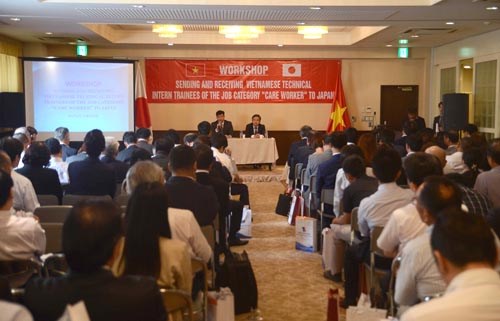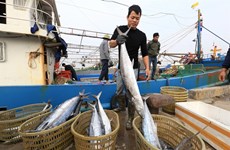Seminar discusses challenges in recruiting caregiver interns for Japan
Strict requirements in language and professional skills are the main obstacles for Vietnamese caregivers who wish to work as interns in Japan under the Japanese Government’s training programme for foreigners.
 Scene at the seminar held by the Vietnam Ministry of Labour, Invalids and Social Affairs (MOLISA) at the Vietnamese Embassy in Tokyo, Japan, on August 6.(Photo: VNA)
Scene at the seminar held by the Vietnam Ministry of Labour, Invalids and Social Affairs (MOLISA) at the Vietnamese Embassy in Tokyo, Japan, on August 6.(Photo: VNA)Tokyo (VNA) – Strict requirements in language and professional skills are the main obstacles for Vietnamese caregivers who wish to work as interns in Japan under the Japanese Government’s training programme for foreigners.
The information was released at a seminar held by the Vietnam Ministry of Labour, Invalids and Social Affairs (MOLISA) at the Vietnamese Embassy in Tokyo, Japan, on August 6.
The event attracted the participation of 200 representatives from Japanese labour unions and Vietnamese enterprises operating in labour export.
To be eligible for working as caregivers in Japan, candidates must receive training in the field and pass the Japanese-Language Proficiency Test (JLPT) at N4 level. The candidates are also required to obtain the JLPT N3 level certificate after one year working in Japan.
Participants also noted that despite the strict requirements, the wage for the apprentice caregivers is not higher than those in other jobs.
Speaking at the seminar, Charge d’Affaires of the Vietnamese Embassy in Japan Nguyen Truong Son said Vietnam is a potential partner of Japan in supplying apprentice caregivers, as the country is facing a serious shortage of thousands of labours in the sector.
According to Kyodo News, Japan’s labour ministry estimates that the country will need an additional 550,000 caregivers in fiscal 2025 compared to the fiscal 2016 due to the rapidly aging population. As an effort to receive more foreign workers in the nursing sector, Japan enacted a new law in November, 2017 to add nursing care to the list of fields in which foreigners can work under a training programme.
The training programme for foreigners was introduced in 1993, aimed at transferring skills to developing countries by training workers who would then return home.
According to the MOLISA’s Department of Overseas Labour, Japan is one of the biggest markets of Vietnamese labourers. By the end of 2017, Vietnam had the highest number of participants in Japan’s training programme for foreigners with about 126,000 interns. The ministry has also licensed six Vietnamese companies to send caregiver interns to Japan.
Earlier this month, Japan and Vietnam signed a memorandum of understanding under which Vietnamese caregiver interns will receive free Japanese language and professional training courses before working in Japan.-VNA












